Syrian refugees face new enemy: winter
AMMAN, Jordan - Snow, driving rain and howling winds in early January compounded the already desperate situation for Syrians caught up in 22 months of civil war seeking to oust President Bashar Assad.
Frustration mounts in refugee waiting game
TORONTO - The 166 Toronto-area parishes with active refugee committees could open a new, more hopeful chapter on up to 700 refugee stories in 2013.
Aid groups gather in Beirut to discuss Syrian refugee crisis
BEIRUT - Representatives of 26 humanitarian agencies gathered in Beirut to discuss and coordinate efforts to address the increasing Syrian refugee crisis.
Cardinal Robert Sarah, president of the Pontifical Council Cor Unum, who visited with Syrian refugees in the Bekaa Valley, presided over the Nov. 9 meeting.
During the cardinal's Nov. 6-10 visit, he also met with Lebanese President Michel Sleiman and participated in the monthly meeting of the council of Maronite Catholic bishops in Bkerke.
At the meeting sponsored by Caritas, the church's charitable agency, the humanitarian organizations agreed to carry out social work for the vulnerable populations inside and outside of Syria, to help alleviate their suffering, including providing medical and spiritual assistance as well as helping them to find shelter and prepare for the winter.
The groups also agreed to institute an efficient coordination system among the Catholic humanitarian organizations to unify their approach on the field.
They also stressed the importance of efforts to allow refugee children to continue their education and to recover some kind of routine in their daily lives.
Pope Benedict XVI had hoped to send a delegation of three cardinals, three bishops and a priest to Syria during the world Synod of Bishops, which met for three weeks at the Vatican in October, to show solidarity with victims and encourage peace negotiations. The papal delegation to Damascus was to have included Cardinal Timothy M. Dolan of New York, chairman of the board of the Catholic Near East Welfare Association.
Pope Benedict announced Nov. 7 that he would send Cardinal Sarah to Lebanon to deliver a $1 million donation and boost the church's humanitarian response to the crisis.
Syria's civil war has left thousands dead and has displaced hundreds of thousands of people since March 2011.
The U.N. refugee agency said Nov. 9 that a record number of Syrian refuges had crossed into Turkey, Lebanon and Jordan, setting a record for a 24-hour period.
The majority -- reportedly 9,000 Syrians -- had crossed into Turkey's Urfa province during the night Nov. 8, said the U.N. High Commissioner for Refugees.
The remaining 2,000 Syrians were registered and assisted by UNHCR in Jordan and Lebanon, the agency said.
Those arrivals bring the number of Syrian refugees in the region to 408,000, the UNHCR said, but the numbers are actually greater because not all of the displaced Syrians entering the countries are registering with the agency.
It said about 115,000 Syrian refugees live in Lebanon. It said approximately 1,000 entering the country daily, including migrant workers who go back and forth between Lebanon and Syria.
Congolese refugees fear going home but feel unwelcome in South Sudan
YAMBIO, South Sudan (CNS) -- As the military hunt for Joseph Kony continues throughout this region, refugees who fled across the border from Congo to escape his Lord's Resistance Army say their welcome in South Sudan is wearing thin.
"I want to go home, but I'm afraid of Kony. As soon as the LRA is gone, I'll go back. It's my country," said Bernadet Adesa, 35, who lives in the Makpandu refugee camp near the border.
"This has been a good place for us, but every day there are more and more problems between us and the South Sudanese. If anything bad happens here, we Congolese get blamed for it," she said.
A Catholic priest who lives in the camp said the refugees are caught between being harassed inside South Sudan or returning to the Congo where the LRA, although weakened, still rampages through the forest, robbing, abducting and killing.
"The Congolese no longer feel welcome here. They live on land that's not theirs, and their freedom to work and make money has been curtailed," Italian Comboni Father Mario Benedetti told Catholic News Service.
After 38 years as a missionary in Congo, Father Benedetti accompanied the refugees to South Sudan in 2008. Today his parish is the refugee camp -- a ramshackle collection of mud huts 25 miles from Yambio.
Father Benedetti suggests tough economic times are at the root of the tension. South Sudan has been in a crisis since January, when the government in Juba cut off the oil it pumps through pipelines that run through neighboring Sudan. A Sept. 27 agreement between the two governments will restart the oil flow, but it will take months for the situation to improve.
"The Congolese are harder workers than the South Sudanese. They're better businesspeople. They can make enough money to buy a motorcycle, and the South Sudanese can't, so they get jealous of the refugees," the priest said.
Authorities have closed a market the refugees opened in the middle of their camp, forcing them to cross the road to buy basic supplies in a Sudanese market. Father Benedetti said the police had prohibited the Congolese from selling bags of charcoal along the road.
"The South Sudanese who live nearby weren't happy because of the competition. So now the refugees can only sell charcoal from their huts, but who's going to stop their car on the road and walk into the camp?" he asked.
Father Benedetti said a local radio station in Yambio is constantly insulting the Congolese and blaming them for every problem, a role he compared to Radio Mille Collines in Rwanda during that country's genocide.
"They're trying to discourage and frighten us, so we'll go back home. But it's not safe there yet. And here the Congolese have health care and schools, services they'd have to pay for back in the Congo," he said.
The bishop of the border area, who was a refugee in Congo and the Central African Republic, said he has spoken with local political officials about the harassment.
"Some of the local political leaders at times fail to respect the rights of the refugees, who are supposed to be protected and not harassed," Bishop Edward Hiiboro Kussala of Tombura-Yambio told Catholic News Service. "The host nation has the obligation to care for these people. But there's little knowledge of this, despite the fact that many of us were once refugees in their country."
The bishop said some refugees have felt forced by the harassment to return to Congo, which was not a safe option.
Security in the immediate area of the border has improved in the last year, in part because of the arrival of U.S. troops dispatched to help area armies combat the LRA. Yet Father Benedetti said he is disappointed in the results.
The U.S. soldiers "say they're here to observe and train other soldiers. But so far we don't know what they're doing," he said. "Yet just as they found Bin Laden, why can't they find Kony? It's an international shame."
Italian Comboni Sister Giovanna Calabria works in the nearby town of Nzara, where some of the U.S. troops are based as part of a joint operation with a special contingent of Ugandan troops.
"People here were happy when they (Americans) came. But no one is sure what they're doing now. I have the impression that their wings are cut. I don't hear that from them, as they keep their mouths closed. But I hear it from others," she said.
Bishop Kussala said that while stepped-up military patrols have recently kept Kony's forces at bay, the area is not truly at peace.
"As long as he's still in the forest, it's a negative peace. There may not be shooting, but the enemy hasn't been arrested and removed," he said.
Bishop Kussala said the church faces a variety of challenges in helping people move back home to rural settlements they abandoned when the LRA roamed the area. He also expressed concern for what might happen with community-based militias, widely known as the "Arrow Boys," which formed to defend isolated communities from LRA violence.
"If the LRA isn't there anymore, they'll find someone to replace the LRA, because they're accustomed to having weapons and moving around. So we're starting a rehabilitation program for these young men, but we need support," he said.
The bishop said that while he supported the military campaign to capture Kony, he was also pushing a diplomatic approach.
"They've employed a military approach to Kony here since 2007, and they still haven't captured him. So we just sent three priests to the Congo to talk about organizing a regional conference to see how the church could deal with this," Bishop Kussala said.
Sister Calabria said she doubts that diplomacy, religious or otherwise, will work.
"There is only one way to stop Kony," she said. "I don't want to kill him. If he is killed, it's his fault because he doesn't surrender.
She said Kony was "not a normal person, and he's forced many other people to not be normal anymore.
"Probably I'm not a good Christian, but it's time to stop him," she added.





